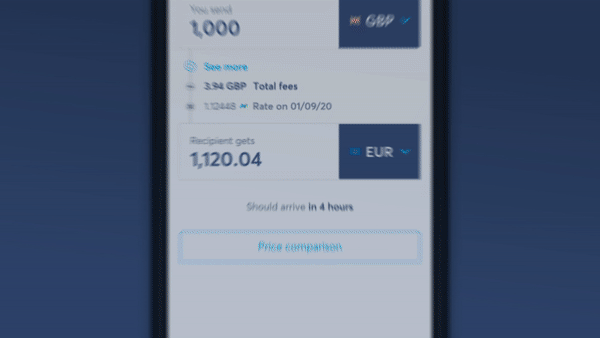Complete Guide to TCS on Foreign Education Loans when Remitting from India
Understanding TCS on education loan remittances from India. Learn how to minimize TCS and save money with Wise, a convenient option to send money abroad.

Canada has a lot to offer students who are eager to receive an undergraduate or graduate degree. With quality education, natural beauty and tuition fees relatively lower than Canada’s neighbor next door, it can be the right choice for Indian students. Read on to find out what it takes to get a Canadian student visa and what you can expect from the process.
| 📝 Table of contents |
|---|
Gaining entry to a country, whether for study or travel, depends on a number of factors. This includes a country’s friendliness to immigration and your personal situation and capabilities. So while this article can help provide guideposts to your immigration as a student abroad, it is not to be taken as advice or recommendations. Reach out to the Canadian government or an immigration specialist to know what is best for your specific journey.
To begin studying at designated learning institutions (DLI) in Canada, Indian students are required to obtain a study permit.¹
🏫 A designated learning institution is a primary, secondary or post-secondary school that is approved by the territory or provincial government in Canada to host international students.²
If the school you are interested in attending is not on the DLI list, you will not be able to get a study permit.
Your study permit is not considered your Canadian visa for entry. Once you are approved for a Canadian study permit, you will be given a visitor or electronic travel authorization (ETA) visa issued as well.
You will need to bring both your study permit and visa with you when you arrive into Canada.
There is only one type of study permit for foreign students that apply from outside Canada. The study permit is valid for the length of your program, plus an additional 3 months.
Here is what you can and can’t do with a Canadian study permit³:
| ✅ | ❌ |
|---|---|
| Study at a DLI that is approved for international students | Study at a school outside of the DLI list. |
| Need to show reasonable and timely progress in your program | De-enroll from your program but continue staying in Canada on the study permit |
| Stay up to 90 days after your program ends | Stay more than 90 days beyond the end of your program, without an extension |
| Return home, as long as you show proof of enrollment and visa validity when you return | You will not be permitted to return if your visa is no longer valid |
| Work on campus or off campus depending on the employer | Work before your study begins |
| Extend your study permit if you qualify | Stay beyond your permit expiry without an extension or new visa |
Let’s break down what it takes to complete your Canadian study permit application.
The Canadian study permit application is recommended to complete and submit online throughthe Canadian government website.
Before you start your application, you must have the following items ready⁴:
It is recommended to apply and get acceptance to the school of your choice in Canada at least 6 months in advance of enrollment for primary or secondary schools, or 1 year in advance for post-secondary.⁵
In addition to the items above, you will need to provide the following in the application process⁶
You may be asked for additional documents depending on your unique application.
| 👤 Indian students may be asked to complete biometric registration as well. This will be notified to you after you submit your application and pay the fee. |
|---|
If required, you will be provided a list of locations in India where you can get the biometric registration done. Try to complete the biometric registration at your earliest as your application processing will only begin once the biometric information is submitted.⁷
Here is a quick step by step guide to the Canadian study permit process:
✒ If your application is accepted, two things will happen
If your application is rejected, you can expect a letter outlining the reasons for rejection.
🚫 Main reasons that a Canadian study permit application may be rejected⁸:
There are a few basic requirements for Indian students to fulfill for a Canadian student visa. The most important one being the evidence of financial support.
The Canadian government wants to see proof that you are able to pay for your living expenses while in the country, in addition to your tuition. And if family members are coming with you, you will also need to show that you can support their living expenses as well.
If you are applying to a DLI in Canada, except for Quebec, you will need to show that you have the following amounts to meet requirements:
| Amount required for the year | Amount required per month | |
|---|---|---|
| For a single applicant | CAN$10,000 / ₹6,04,198 | CAN$833/ ₹50,3301 |
| For the 1st family member | CAN$4,000/ ₹2,41,679 | CAN$333/ ₹20,120 |
| For the 2nd family member or more | CAN$3,000/ ₹1,81,259 | CAN$255/ ₹15,407 |
*All INR prices shown are converted at the mid-market exchange rate of CAN$1 = ₹60.42 as of May 7, 2021
👪 The amount required would be the sum required for you and all your family members that will be accompanying you. So if you had 2 family members that are accompanying you, the amount required to show:
CAN$ 10,000 + CAN$ 4,000 + CAN$ 3,000= CAN$ 17,000 / ₹10,27,136
The required financial amount is in addition to the school’s tuition fees.
If you are applying for a study permit for a school in Quebec, the amount required is slightly higher than the rest of the country, and with different amounts depending on the age of your family members.
For evidence of meeting the financial requirement listed above, you can show any of the following as part of your application⁹:
Canada allows international students to bring family members with them when they come to study. The family members include:
You will need to complete an application for each family member, alongside your application. All the applications will need to be submitted together with only 1 payment receipt for the entire family’s total application fee.
If your family’s applications are approved and your children are of school-going age, they can attend school in Canada during the length of your stay.
A spouse, common law partner and dependent children must meet the basic requirements for being a temporary resident in Canada.¹⁰
Whether you need to pay for tuition, your GIC or just send a little extra spending money to family overseas, use Wise for quick and easy global transfers.
Wise uses smart tech to make global money transfers low-cost and simple right from your Android/ iOS app.

And if you are currently studying in Canada, get a Wise account and card that you can use like a local. Whether you want to receive, keep, spend or send money, its a breeze with the international wallet at Wise.
So join the 10 million people around the world that use Wise to get their money where it needs to go the fast, secure and easy way.
Open your free Wise account now 🚀
Here is the quick list of the documents usually asked for in a study permit application,
Additionally, you may be asked for:
The Canadian government may ask for additional documents depending on the nature of your application. ¹⁰
As of May 7th 2021, the Canadian study permit processing time is typically 10 weeks for foreign nationals outside of Canada.
This time however does not include the time needed to complete the biometrics. ¹¹
Indian students can cut down their study permit’s processing time from 10 weeks to 20 days by applying through Direct Stream.¹²
To apply through Direct Stream you must be outside of Canada, an Indian citizen and provide the following:
The Canadian study permit fee is CAN$ 150 per application, including for Direct Stream applicants.¹³
Here is how the Canadian study permit application fee looks in Indian Rupees:
| Canadian Dollars | Indian Rupees | |
|---|---|---|
| Application Fee | $150 | ₹9,063 |
*All INR prices shown are converted at the mid-market exchange rate of CAN$1 = ₹60.42 as of May 7, 2021
| 🖨 If you found this guide helpful or want to refer to it later, right click on the screen and click ‘Print’, then save it as a PDF |
|---|
Sources
All sources checked as of 7 May, 2021
*Please see terms of use and product availability for your region or visit Wise fees and pricing for the most up to date pricing and fee information.
This publication is provided for general information purposes and does not constitute legal, tax or other professional advice from Wise Payments Limited or its subsidiaries and its affiliates, and it is not intended as a substitute for obtaining advice from a financial advisor or any other professional.
We make no representations, warranties or guarantees, whether expressed or implied, that the content in the publication is accurate, complete or up to date.

Understanding TCS on education loan remittances from India. Learn how to minimize TCS and save money with Wise, a convenient option to send money abroad.

Learn how Flywire works for international payments. This guide covers exchange rates, fees, security, and alternatives to sending money abroad.

Complete guide to Bank of India - New Zealand branch services catering towards NRIs based in NZ. Plus tips on how to save when remitting to India with Wise.

Complete guide to Bank of Baroda - New Zealand branch services catering towards NRIs based in NZ. Plus tips on how to save when remitting to India with Wise.

Learn how NRIs can vote in India's 2024 elections in our guide to voting for Indians living abroad.

Complete guide to education loans available for Indian students pursuing higher studies abroad. Read on to go over the available options & general requirements.